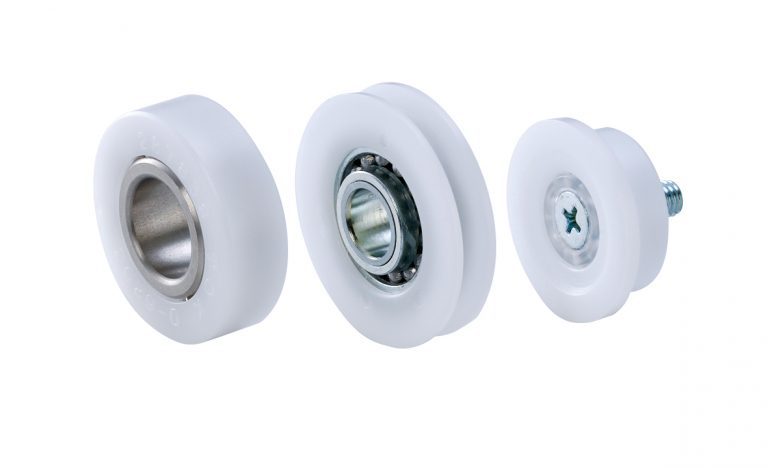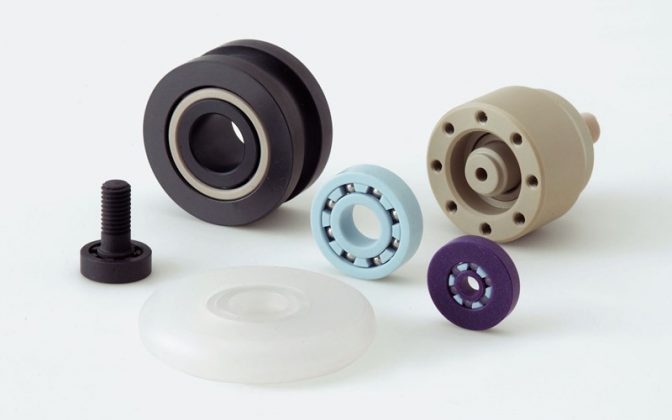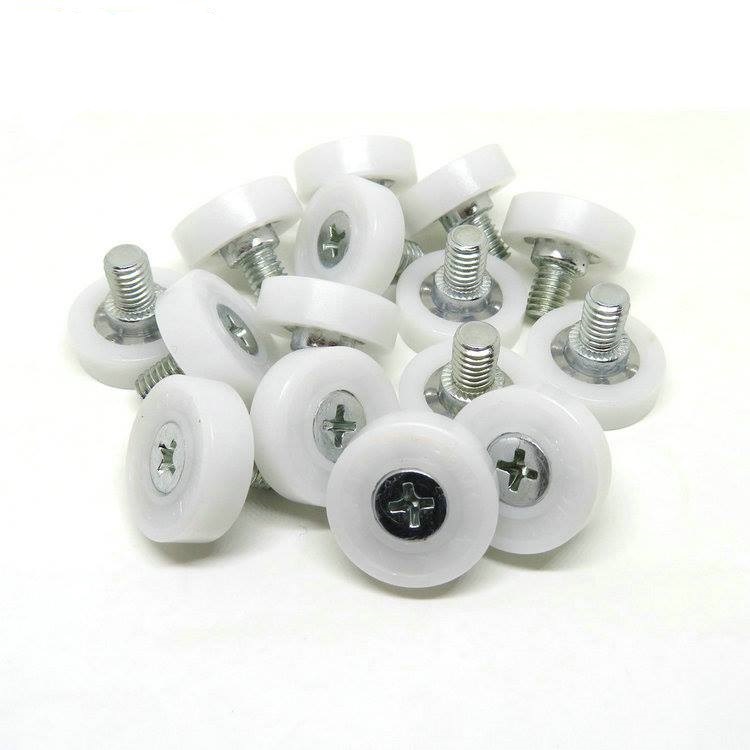Product Description
Product Description
Engineering Plastic Linear Bearing features maintance free,long term dry operation,no noise
Suitable for dust long term operation,corrosionresistance and cleaning with disinfectant;
Chute design for shaft protection,reduce the groove width to enhance the bearing capacity;
Easy installation and replacement.
Product Parameters
| Product Name | Engineering Plastic Linear Bearing |
|
Type |
Linear |
| Model Number | RJUM—50 |
| Brand Name | OEM |
| Color | Yellow,Black |
| Application | Manufacturing Plant,CNC machine .etc |
| Material | Anodized Aluminum and engineering Plastic |
| Place of Origin | ZHangZhoug,China |
| Size | Dimensionally interchangeable with linear ball bearings |
| Sample | Available |
Detailed Photos
Company Profile
HangZhou City CZPT Bearing Co., Ltd. is a professional manufacturer of linear motion products with many years’ experience. We are specialized in the producing linear shaft, linear guides, ball screws, linear bearings, linear CZPT blocks, ball screw end supports, linear rails, cam followers with good quality and competitive price. Our company is located in HangZhou city, ZHangZhoug province, close to HangZhou port and HangZhou city.
Our products are widely used in precise machines, fitness equipment, printing machines, packing machines, medical and food machines, textile machinery and other machines and supplementary equipment. Our products sell well in North America, West Europe, Australia, Southeast Asia, Middle East, South America and other regions.
After Sales Service
Our Quality:
Quality is the life . We use only the best quality material to ensure the standard of our product range is of the highest caliber.All products we sold out are strictly selected and tested by our QC department.
Warranty:
All products may have problem after used by a period of time. We provide 1 year warranty for all products.
Payment:
We accept payment via TT (Bank transfer), Paypal,Western Union, and Money Gram.
We accept bank transfer for large orders. For small order, you’d better pay via Paypal,Western union or Money Gram
Shipping:
We offer as many shipping options as possible, including DHL, UPS, TNT, FEDEX and EMS, Airfreight and by Sea.
FAQ
1. Are you factory or trading company?
We are professional manufacturer with most competitive price and high quality, 15 year’s experience.
2.What’s your product range?
We are specialized in producing linear shafts, linear bearings, linear guides, linear rails, ball screws,cam follower and other linear motion units.
3.Do you offer OEM&ODM services?
Yes, OEM, ODM is welcomed
4.How Can I get some samples?
We are honored to offer samples. You are requested to pay the shipping cost and some samples cost.
5.What does your factory do about quality control?
We uphold the tenet of “Quality is the future, we have passed ISO9001 certification, and we have strict procedures to control quality.
6. How can I get a quotation?
You can send quotation below or email to us. you can contact dirrectly with us through TM or WhatsApp,Skype as you like.Call any time if you are urgent.
/* January 22, 2571 19:08:37 */!function(){function s(e,r){var a,o={};try{e&&e.split(“,”).forEach(function(e,t){e&&(a=e.match(/(.*?):(.*)$/))&&1
| Feature: | Corrosion Resistant, High Temperature, High Speed |
|---|---|
| Function: | Ordinary |
| Shape: | Straight |
| Series: | Short |
| Material: | Aluminum and Plastic |
| Type: | Universal |
| Customization: |
Available
| Customized Request |
|---|

What are the eco-friendly or sustainable aspects of plastic bearing materials?
Plastic bearing materials offer several eco-friendly and sustainable aspects. Here’s a detailed explanation:
- 1. Recyclability:
Many plastic bearing materials are recyclable. At the end of their useful life, these bearings can be collected, processed, and transformed into new plastic products or materials. Recycling plastic bearings helps reduce waste, conserve resources, and minimize the environmental impact associated with their disposal. This promotes a circular economy and reduces the demand for virgin plastic production.
- 2. Use of Recycled Content:
Some plastic bearing materials can be manufactured using recycled content. By incorporating recycled plastics into the production process, the reliance on new plastic raw materials is reduced. This helps conserve resources, reduce energy consumption, and decrease the carbon footprint associated with the manufacturing of plastic bearings.
- 3. Lower Energy Consumption:
Plastic bearings often require less energy consumption compared to metal bearings. This is primarily due to their lower weight, which reduces the energy required for transportation, installation, and operation. Additionally, plastic bearings can operate without the need for external lubrication, eliminating the energy consumption associated with lubrication systems or processes.
- 4. Reduced Maintenance and Lubrication:
Plastic bearings can offer reduced maintenance requirements and eliminate the need for external lubrication. Unlike metal bearings, many plastic bearings are self-lubricating or have low friction properties, allowing them to operate effectively without the need for regular lubrication. This not only reduces maintenance efforts and costs but also minimizes the use of lubricants, which can be environmentally harmful if not properly managed.
- 5. Chemical Resistance and Durability:
Plastic bearing materials often exhibit excellent chemical resistance and durability. This enables them to withstand harsh environments and aggressive substances without degradation or the need for frequent replacements. The longevity and resistance to chemical attack reduce the overall environmental impact associated with the production, use, and disposal of plastic bearings.
- 6. Lighter Weight:
Plastic bearings are generally lighter in weight compared to metal bearings. This lightweight characteristic offers several eco-friendly benefits. Firstly, it reduces the energy required for transportation and installation, resulting in lower fuel consumption and greenhouse gas emissions. Secondly, it can contribute to weight reduction in machinery or equipment, leading to energy savings during operation.
In summary, plastic bearing materials offer several eco-friendly and sustainable aspects, including recyclability, use of recycled content, lower energy consumption, reduced maintenance and lubrication requirements, chemical resistance and durability, and lighter weight. By choosing plastic bearings with these sustainable attributes, industries can reduce their environmental footprint, promote resource conservation, and contribute to a more sustainable and eco-friendly approach to bearing technology.

What are the potential challenges or limitations of using plastic bearings in specific industries?
While plastic bearings offer numerous advantages, they also have certain challenges and limitations when used in specific industries. Here’s a detailed explanation of the potential challenges or limitations:
- 1. Temperature Limitations:
One of the limitations of plastic bearings is their temperature limitations. Different types of plastic materials have varying temperature ranges within which they can operate effectively. In high-temperature environments, plastic bearings may experience reduced load capacity, increased friction, or even deformation. Therefore, in industries such as aerospace, automotive, or heavy machinery, where high temperatures are common, alternative bearing materials may be more suitable.
- 2. Load Capacity:
Plastic bearings generally have lower load carrying capacities compared to their metal counterparts. They may not be suitable for applications with extremely high loads or heavy machinery where substantial forces are involved. Exceeding the load capacity of plastic bearings can lead to premature wear, deformation, or failure. Therefore, in industries that require heavy-duty applications or high load capacities, metal bearings or other robust bearing solutions may be preferred.
- 3. Speed Limitations:
Plastic bearings may have limitations when it comes to high-speed applications. The speed at which plastic bearings can operate effectively without experiencing excessive friction, heat buildup, or wear is typically lower compared to metal bearings. In industries that require high rotational speeds, such as industrial machinery or automotive applications, alternative bearing materials or specialized designs may be necessary to handle the demands of high-speed operation.
- 4. Chemical Compatibility:
While plastic bearings offer excellent chemical resistance to a wide range of substances, they may not be compatible with certain aggressive chemicals or solvents. Some chemicals can cause degradation, swelling, or softening of certain plastic materials, affecting the performance and lifespan of the bearings. In industries where exposure to harsh chemicals is prevalent, it is crucial to select plastic bearings that are specifically designed to withstand the specific chemical environment or consider alternative bearing materials.
- 5. Abrasion and Wear:
Plastic bearings may be more susceptible to abrasion and wear compared to metal bearings, especially in applications involving abrasive particles or high levels of friction. While plastic bearings are designed to resist wear, prolonged exposure to abrasive conditions can lead to increased wear rates and reduced lifespan. In industries such as mining, construction, or material handling, where abrasive contaminants are present, additional protective measures or alternative bearing materials may be necessary to ensure long-term performance.
- 6. Application-Specific Considerations:
Each industry has its specific requirements and operating conditions that must be considered when selecting bearings. Factors such as load type, vibration, shock, moisture, and environmental conditions can impact the suitability of plastic bearings. It is essential to evaluate the specific application requirements and consult with bearing manufacturers or industry experts to determine whether plastic bearings can meet the demands of the particular industry.
In summary, while plastic bearings offer many advantages, they also have limitations in specific industries. Temperature limitations, load capacity, speed limitations, chemical compatibility, abrasion and wear susceptibility, and application-specific considerations are important factors to consider when deciding whether plastic bearings are suitable for a particular industry or if alternative bearing materials should be considered.

How do plastic bearings contribute to reduced friction and noise in machinery?
Plastic bearings play a significant role in reducing friction and noise in machinery. Here’s a detailed explanation of how plastic bearings contribute to these benefits:
- 1. Low Friction Coefficient:
Plastic bearings are designed to have low friction coefficients, which means they generate less resistance as the bearing surfaces slide or roll against each other. The low friction coefficient of plastic materials, such as PTFE (polytetrafluoroethylene) or nylon, helps minimize the amount of energy required to rotate or move the bearing. This reduction in friction results in several advantages, including lower power consumption, improved efficiency, and reduced wear on the bearing surfaces.
- 2. Self-Lubricating Properties:
Many plastic bearings have self-lubricating properties, which means they can operate effectively without the need for external lubrication. The plastic materials used in these bearings contain additives or solid lubricants that provide a thin film of lubrication between the bearing surfaces. This self-lubrication minimizes friction and wear, enhances the bearing’s performance, and reduces the need for regular lubrication maintenance. As a result, plastic bearings contribute to smoother operation and lower friction-related noise in machinery.
- 3. Damping Characteristics:
Plastic materials used in bearings often possess inherent damping characteristics. Damping refers to the ability of a material to absorb or dissipate vibrations and energy. Plastic bearings can effectively absorb vibrations generated during machinery operation, which helps reduce the transmission of vibrations to other parts of the system. This damping effect contributes to a quieter operation by minimizing the noise generated by machinery vibrations.
- 4. Reduced Metal-to-Metal Contact:
Plastic bearings create a barrier between metal surfaces, reducing direct metal-to-metal contact. This separation prevents or minimizes the occurrence of metal-to-metal friction, which can lead to increased noise levels. The plastic material acts as a cushioning layer, reducing the impact and noise generated by metal components rubbing against each other. By reducing metal-to-metal contact, plastic bearings contribute to quieter machinery operation.
- 5. Vibration Isolation:
Plastic bearings can help isolate and dampen vibrations within machinery. The elastic and damping properties of plastic materials allow them to absorb and dissipate vibrations, preventing them from propagating throughout the system. By isolating vibrations, plastic bearings help reduce the transmission of vibrations to other parts of the machinery, minimizing noise generation. This vibration isolation contributes to a quieter overall operation.
Overall, plastic bearings offer several advantages that contribute to reduced friction and noise in machinery. Their low friction coefficients, self-lubricating properties, damping characteristics, reduced metal-to-metal contact, and vibration isolation capabilities all work together to minimize energy losses, wear, and noise generation. However, it’s important to consider specific application requirements and consult manufacturers’ guidelines to ensure the appropriate selection and use of plastic bearings for optimal performance in machinery.


editor by CX 2024-05-03